$30,000 rumor? Tabloid paid for, spiked, salacious Donald Trump tip
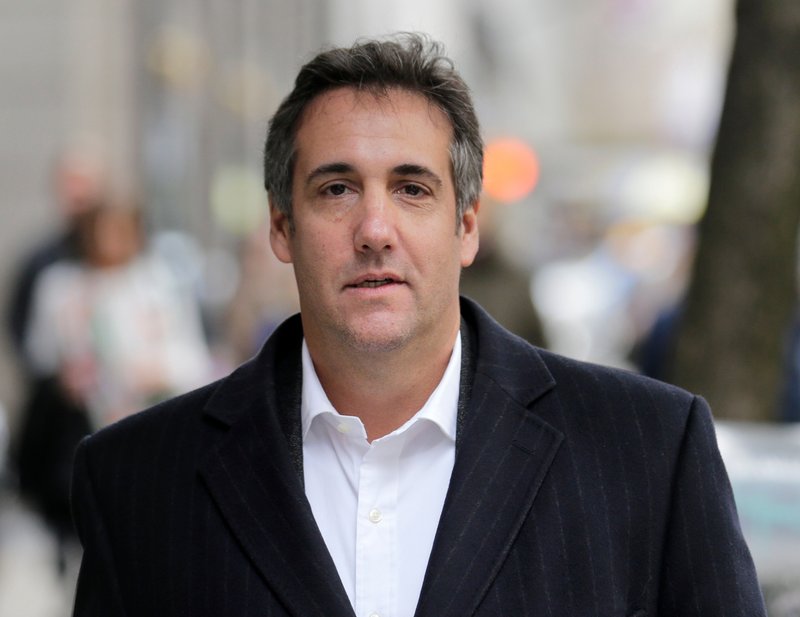
Eight months before the company that owns the National Enquirer paid $150,000 to a former Playboy Playmate who claimed she’d had an affair with Donald Trump, the tabloid’s parent made a $30,000 payment to a less famous individual: a former doorman at one of the real estate mogul’s New York City buildings. As it did with the ex-Playmate, the Enquirer signed the ex-doorman to a contract that effectively prevented him from going public with a juicy tale that might hurt Trump’s campaign for president. The payout to the former Playmate, Karen McDougal, stayed a secret until The Wall Street Journal published a story about it days before Election Day. Since then curiosity about that deal has spawned intense media coverage and, this week, helped prompt the FBI to raid the hotel room and offices of Trump’s personal lawyer, Michael Cohen. The story of the ex-doorman, Dino Sajudin, hasn’t been told until now. The Associated Press confirmed the details of the Enquirer’s payment through a review of a confidential contract and interviews with dozens of current and former employees of the Enquirer and its parent company, American Media Inc. Sajudin got $30,000 in exchange for signing over the rights, “in perpetuity,” to a rumor he’d heard about Trump’s sex life — that the president had fathered a child with an employee at Trump World Tower, a skyscraper he owns near the United Nations. The contract subjected Sajudin to a $1 million penalty if he disclosed either the rumor or the terms of the deal to anyone. Cohen, the longtime Trump attorney, acknowledged to the AP that he had discussed Sajudin’s story with the magazine when the tabloid was working on it. He said he was acting as a Trump spokesman when he did so and denied knowing anything beforehand about the Enquirer payment to the ex-doorman. The parallel between the ex-Playmate’s and the ex-doorman’s dealings with the Enquirer raises new questions about the roles that the Enquirer and Cohen may have played in protecting Trump’s image during a hard-fought presidential election. Prosecutors are probing whether Cohen broke banking or campaign laws in connection with AMI’s payment to McDougal and a $130,000 payment to porn star Stormy Daniels that Cohen said he paid out of his own pocket. Federal investigators have sought communications between Cohen, American Media’s chief executive and the Enquirer’s top editor, the New York Times reported. Cohen’s lawyer has called the raids “inappropriate and unnecessary.” American Media hasn’t said whether federal authorities have sought information from it, but said this week that it would “comply with any and all requests that do not jeopardize or violate its protected sources or materials pursuant to our First Amendment rights.” The White House didn’t respond to questions seeking comment. On Wednesday, an Enquirer sister publication, RadarOnline, published details of the payment and the rumor that Sajudin was peddling. The website wrote that the Enquirer spent four weeks reporting the story but ultimately decided it wasn’t true. The company only released Sajudin from his contract after the 2016 election amid inquiries from the Journal about the payment. The site noted that the AP was among a group of publications that had been investigating the ex-doorman’s tip. During AP’s reporting, AMI threatened legal action over reporters’ efforts to interview current and former employees and hired the New York law firm Boies Schiller Flexner, which challenged the accuracy of the AP’s reporting. Asked about the payment last summer, Dylan Howard, the Enquirer’s top editor and an AMI executive, said he made the payment to secure the former Trump doorman’s exclusive cooperation because the tip, if true, would have sold “hundreds of thousands” of magazines. Ultimately, he said the information “lacked any credibility,” so he spiked the story on those merits. “Unfortunately … Dino Sajudin is one fish that swam away,” Howard told RadarOnline on Wednesday. But four longtime Enquirer staffers directly familiar with the episode challenged Howard’s version of events. They said they were ordered by top editors to stop pursuing the story before completing potentially promising reporting threads. They said the publication didn’t pursue standard Enquirer reporting practices, such as exhaustive stakeouts or tabloid tactics designed to prove paternity. In 2008, the Enquirer helped bring down presidential hopeful John Edwards in part by digging through a dumpster and retrieving material to do a DNA test that indicated he had fathered a child with a mistress, according to a former staffer. The woman at the center of the rumor about Trump denied emphatically to the AP last August that she’d ever had an affair with Trump, saying she had no idea the Enquirer had paid Sajudin and pursued his tip. The AP has not been able to determine if the rumor is true and is not naming the woman. “This is all fake,” she said. “I think they lost their money.” The Enquirer staffers, all with years of experience negotiating source contracts, said the abrupt end to reporting combined with a binding, seven-figure penalty to stop the tipster from talking to anyone led them to conclude that this was a so-called “catch and kill” — a tabloid practice in which a publication pays for a story to never run, either as a favor to the celebrity subject of the tip or as leverage over that person. One former Enquirer reporter, who was not involved in the Sajudin reporting effort, expressed skepticism that the company would pay for the tip and not publish. “AMI doesn’t go around cutting checks for $30,000 and then not using the information,” said Jerry George, a reporter and senior editor for nearly three decades at AMI before his layoff in 2013. The company said that AMI’s publisher, David Pecker, an unabashed Trump supporter, had not coordinated its coverage with Trump associates or taken direction from Trump. It acknowledged discussing the former doorman’s tip with Trump’s representatives, which it described as “standard operating procedure in stories of this nature.” The Enquirer staffers, like many of the dozens of other current and
Kevin McCarthy and Steve Scalise are likely contenders for House speaker
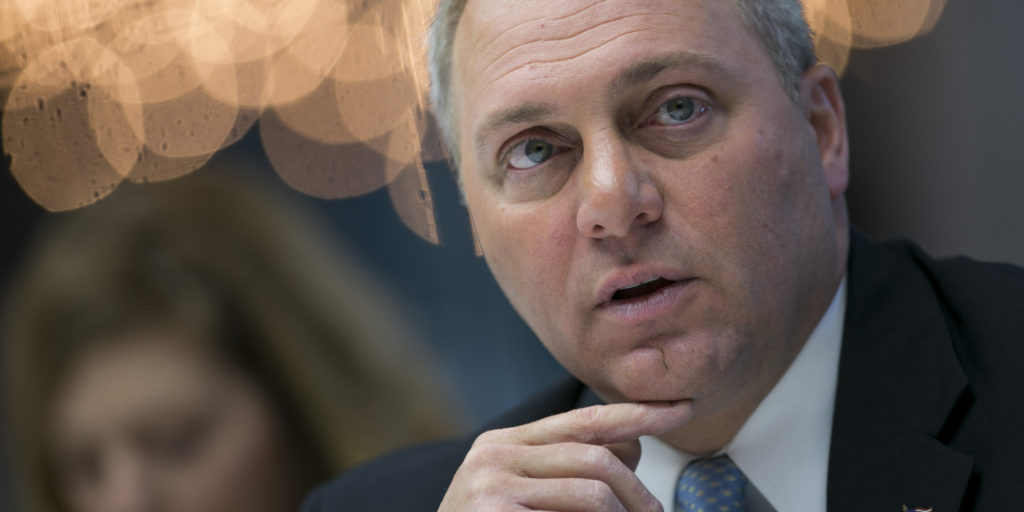
Some say it’s a fight between West and South. Or who might win an endorsement from President Donald Trump. Or a test of who can woo conservatives. But one thing is clear: If the showdown between California Rep. Kevin McCarthy and Louisiana Rep. Steve Scalise for House speaker is a popularity contest, it will be tight. “Steve is the more low-key guy, Kevin is more the big handshake, but they’re equally popular,” said Rep. Peter King, R-N.Y. “It’s not like right versus left or a good guy versus a bad guy.” House Speaker Paul Ryan told colleagues Wednesday he wouldn’t seek re-election in November, implicitly starting the race to replace him. Disconcertingly for the GOP, Trump’s unpopularity and early Democratic momentum leave it unclear whether Ryan’s replacement will be speaker or minority leader. For now, McCarthy and Scalise are seen as the chief contenders. McCarthy, 53, an affable Californian, is his party’s No. 2 House leader and was one of the earliest and steadiest backers of Trump’s presidential campaign. If Trump weighs into the contest, his clout could rally lawmakers behind his favored candidate, though it could alienate others who want a leader who has their back, not necessarily the president’s. It’s uncertain whether Trump will intervene or who he’d support. McCarthy was elected in 2006 and rocketed into a leadership job in 2009, thanks to his campaigning for fellow Republicans. He replaced Eric Cantor as majority leader in 2014 after the Virginian unexpectedly lost a primary for his House seat and quit. In 2015, McCarthy sought to succeed Speaker John Boehner, R-Ohio, who’d alienated conservatives who considered him insufficiently doctrinaire. McCarthy abruptly left that contest days later after failing to line up enough votes, and Ryan accepted the post. Scalise, 52, the House GOP vote counter and No. 3 leader, was first elected a decade ago and had little national name recognition until tragedy thrust him into headlines. He was shot at a congressional baseball practice last year and is still recovering from his injuries, an ordeal that’s earned the conservative former state legislator broad respect. “The strength he’s shown with his injury, I think, has heightened where he is” among colleagues, said Rep. Phil Roe, R-Tenn. Lawmakers and GOP donors want a leader who can raise money, and there McCarthy has an advantage. He raised $8.75 million in the first quarter of this year and has done fundraisers for 40 GOP candidates, said a person familiar with his political operation. Scalise has raised $3 million, a record for House whips, and hosted almost 50 events, his aides said. Neither man is known for rhetorical flourishes, with McCarthy in particular prone to sentences that defy the rules of grammar. And both have resume problems that fellow Republicans insisted they’d overcome. In 2014, Scalise was discovered to have addressed a white-supremacist group in 2002 founded by former Ku Klux Klan leader David Duke. Scalise apologized and said he’d been unaware of the group’s racial views. McCarthy suggested in 2015 that a House committee probing the deadly 2012 raid on the U.S. embassy in Benghazi, Libya, had damaged Democratic presidential candidate Hillary Clinton’s poll numbers, undermining GOP arguments that the investigation wasn’t politically motivated. That raised questions about his ability as a communicator, a key for party leaders. But he was one of Trump’s earliest and most loyal congressional supporters in the 2016 presidential race. Some Republicans prefer Scalise’s deep red state background to McCarthy’s bright blue California, since the GOP’s chief strongholds are in rural and red state districts. “You have a lot of the Southern states who are looking to shift leadership back to that part of the country,” said Rep. Steve Russell, R-Okla. Scalise is viewed as more conservative than McCarthy, important in a House GOP conference that’s drifted to the right. That could be intensified after November, when Republicans are expected to lose seats and many of those departing will be moderates. Conservative groups have awarded Scalise modestly stronger voting ratings than McCarthy. But McCarthy has worked to improve his relationship with conservatives, including trying to craft legislation cutting spending from the government budget enacted recently. Either man could cut a deal with the House Freedom Caucus. Those roughly 30 conservative members could theoretically deliver their votes to a contender in exchange for a promise to back a caucus member for a leadership post. Rep. Mark Meadows, R-N.C., who heads the Freedom Caucus, said a candidate’s willingness to listen to all lawmakers is “probably the top priority” for backing someone. Neither Scalise nor McCarthy would acknowledge a race for Ryan’s job or definitively deny it. Scalise said it’s not “time to talk about what titles people want,” while McCarthy said, “There is no leadership election. Paul is speaker.” Those close to Scalise say he is unlikely to directly challenge McCarthy. But he doesn’t need to. By offering himself as an alternative choice, ready in case McCarthy fails to muster support, he is essentially making an indirect bid for the top post. Congressional leadership races often move quickly, with candidates rushing to win supporters and outmaneuver rivals. Several lawmakers said privately such moves are underway. But others said the race could stretch until after the election clarifies the number, ideology and mood of House Republicans. Republished with the permission of the Associated Press.
Parker Snider: A guide to fake news

More than once every day. That’s how often President Donald Trump publicly calls something “fake”—be it a story, poll, or news organization. Just this week, Facebook CEO and Founder Mark Zuckerberg testified before Congress about, among other things, the proliferation of falsities on his social media platform, including in Alabama’s special election for U.S. Senate last year. We see the term everywhere, hear it lobbied daily on cable news, and use it ourselves (although perhaps often in jest). But what really is fake news and how do we spot it? The term “fake news” is often used to describe three very distinct and separate entities. First, the reporting of reputable national organizations (think press that have a seat in the White House briefing room, especially those in the first few rows) is often labeled as “fake news”. Although many would argue otherwise, the fact is that outright lies by the news divisions of these organizations are rare. When reporting failures do occur, news organizations hold their reporters accountable and publicly apologize and correct the story. The suspension of ABC’s Brian Ross after incorrectly reporting that Trump had directed Michael Flynn to contact Russian officials before the 2016 election is one example. This doesn’t mean, however, that print or televised media are free from falsehoods. They’re not. That’s because newspapers and news channels aren’t just publishing journalism—no, their business requires something else—opinion and commentary, the second bearer of the “fake news” label. Fox News’ Chief News Anchor Shephard Smith isn’t shy about rebutting the unsubstantiated claims of his primetime opinion counterparts. Why? In his words, “We serve different masters.” In his interview with Time, he goes on to say, “They don’t really have rules on the opinion side…some of our opinion programming is there strictly to be entertaining.” Nevertheless, false news and misrepresentation is most onerous and rampant, not on television or in newspapers, but on social media, the third and most appropriately labeled agent of “fake news”. Facebook and its competitors are places where claims, no matter how ridiculous, baseless, and unproven, spread like wildfire. It’s where we see a supposed ‘Friends’ reunion, that President Obama was a Black Panther, that Pope Francis cancelled the Bible, and that Snopes, a useful fact checking website, has ties to George Soros. Even so, Facebook is a major source of news for many people. Thanks to this and increased cries of “fake news”, I’ve found a few practices helpful in maneuvering this volatile news environment. As NPR’s Anya Kamenetz suggests, I begin with a gut check. Does what I’m reading affirm my biases, my hopes, and my expectations? If so, I should adopt a healthy level of suspicion. Second, I automatically reject any news in the form of a meme or screenshot. These easily sharable images often have incendiary captions, outlandish claims, and lack sources. They are designed to go viral—like the emails of yesteryear that promise a free vacation if you simply forward to ten friends—and they are rarely factual. Political memes and screenshots are one way Russians fostered division in 2016, and they are genuinely worthless. Third, I check the source. Does the website, newspaper, or cable news channel have a history of deceptive practices or falsehoods? Are they well-known and given access to government officials, or do they have a strange web address, an unknown name, or a homepage full of inflammatory headlines? Fourth, I look to see if other sources are corroborating the report. If not and the news is a credible exclusive, I expect the reporting organization to include their sources in the article. Fifth, I determine whether the author is a journalist or a commentator. As described earlier, commentators and journalists are very different, as are their standards. Finally, before reposting or sharing, I consider my own credibility. Do I want to be someone who shares unsubstantiated news and memes, or do I want to ensure its accuracy, and therefore my own? I’ve found these methods helpful, and I hope you do as well. ••• Parker Snider is Policy Relations Manager at the Alabama Policy Institute (API). API is an independent, nonpartisan, nonprofit research and educational organization dedicated to strengthening free enterprise, defending limited government, and championing strong families. If you would like to speak with the author, please e-mail communications@alabamapolicy.org or call (205) 870-9900.
Kay Ivey changes stance, signs order prohibiting use of loaned executives
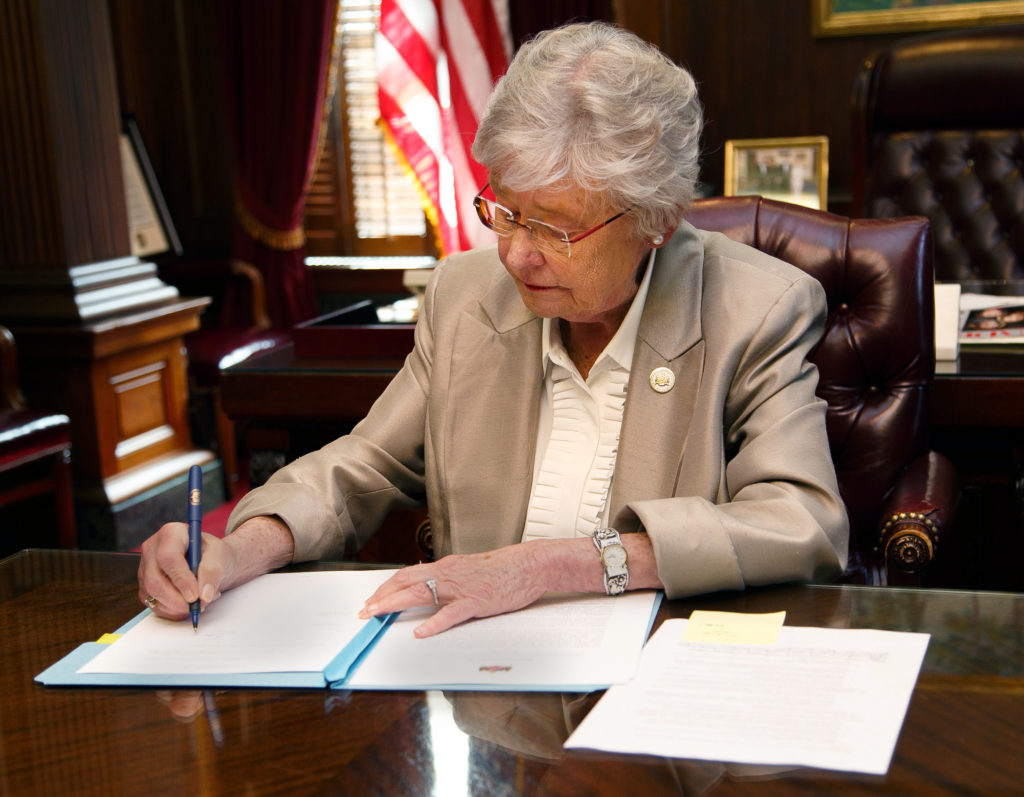
On the first day of her second year as Alabama governor, Gov. Kay Ivey on Wednesday signed an executive order that bans the practice of “loaning” executives in Alabama’s executive branch agencies, despite saying she was okay with the practice just last week. On April 5, Ivey went on record with WSFA 12 and told them she does not “have any problem with loaned executives” While adding that she does believe they need to be under the ethics law. Nevertheless, six days later, without explanation of the reverse of her position, Ivey signed Executive Order 714. Effective immediately the order prohibits any executive branch agencies from being “loaned” non-governmental personnel while they are also being paid by private entities, thus ensuring outside parties or entities do not have an inappropriate amount of influence in the executive operations of state. “When I first took office one year ago, I promised an open and transparent administration; I’ve followed through on that promise and this directive is just another part of our continuing efforts,” Ivey said. “Executive Order 714 will prohibit someone from working in a key government role while taking a salary from private sources for the work being performed.” The order applies to any appointments made by Ivey, or any other member of the executive branch. Executive appointees or staff members cannot serve in the Ivey administration while also receiving compensation from any private company for the work being performed for the state. The order also prohibits all appointees or staff members from seeking a private company to provide a loaned employee and or compensation from a private entity, and does not apply to personnel serving on state boards, state commissions or to state contractors.
Mike Pompeo defends Donald Trump on Russia, won’t talk about Robert Mueller
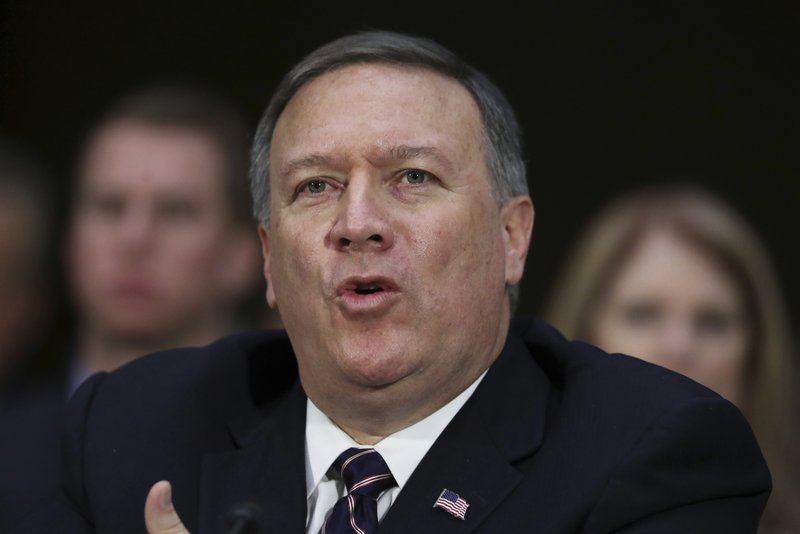
Mike Pompeo, the CIA director nominated to be secretary of state, defended the Trump administration’s efforts to push back on aggression from Russia at his confirmation hearing Thursday while suggesting more sanctions on Moscow are still needed. Yet he dodged repeatedly when Democrats tried to pin him down on President Donald Trump’s handling of the special investigation into Russian interference in the 2016 election. Pompeo confirmed for the first time publicly that he’s been interviewed by special counsel Robert Mueller, who is investigating potential ties between Russia and Trump’s presidential campaign and possible obstruction of justice issues. But he wouldn’t answer questions about the contents of the interview, arguing it would be improper since, as CIA director in charge of overseas intelligence gathering, he has been a “participant” in Mueller’s probe. “I cooperated,” Pompeo said. Under questioning, he said he would be unlikely to resign as secretary of state if Trump were to fire Mueller. Lawmakers are concerned the president may seek Mueller’s ouster to try to shut down the investigation, and the White House has said it believes Trump does have the authority to fire him if desired. “My instincts tell me no,” Pompeo said. “My instincts tell me my obligation to continue to serve as America’s senior diplomat will be more important in times of domestic political turmoil.” As for the prospect of leading the State Department, Pompeo pledged to make the department as central to national security decisions as the intelligence agency he now heads. Throughout the hearing, he drew a sharp contrast with his ousted predecessor, Rex Tillerson. He lamented the “demoralizing” vacancies at the top echelons of the department during Tillerson’s tenure and said he planned to fill those vacancies, asking the Senate’s help to get nominees confirmed. He cast his close connection to Trump as an advantage that would help him restore the significance of the department. “My relationship with President Trump is due to one thing: We’ve demonstrated value to him at the CIA. So, in turn, he has come to rely on us,” Pompeo said. “I intend to ensure that the Department of State will be just as central to the president’s policies and the national security of the United States.” His remarks before the Senate Foreign Relations Committee were the first chance for lawmakers and the public to hear directly from the former Kansas congressman about his approach to diplomacy and the role of the State Department, should he be confirmed. Pompeo’s views on global issues are well known — he was questioned extensively by senators for his confirmation to run the CIA — but Democratic senators have raised questions about his fitness to be top diplomat, given his hawkish views and past comments about minorities. Sen. Cory Booker, D-N.J., took Pompeo to task over for saying previously that Muslims have a special obligation to denounce extremism and for his longstanding position that gays should not be able to marry. “I continue to hold that view,” Pompeo said of gay marriage, though he declined repeatedly to answer whether he believes gay sex is a “perversion.” Instead, Pompeo responded to the criticism by saying repeatedly that his record at the CIA and elsewhere proves he treats everyone equally and with respect, regardless of religion, gender or sexual orientation. He sought to pre-empt concerns about Trump’s apparent unwillingness to challenge Russian President Vladimir Putin directly. He said a long list of punitive actions taken under Trump show the U.S. takes the threat from Russia seriously, adding that “we need to push back in each place we confront them,” including the economic and cyber arenas. “Each of those tools that Vladimir Putin is using, we need to do our best to make sure he doesn’t succeed,” Pompeo said. An avowed opponent of the Iran nuclear deal, Pompeo said he’d work immediately if confirmed to “fix” the agreement that Trump has threatened to abandon if it’s not strengthened. Pompeo wouldn’t say explicitly if he’d advocate a withdrawal if there’s no fix by Trump’s May 12 deadline, suggesting there could be an extension if significant progress was being made by then. Still, he affirmed that he won’t support staying in over the long term unless more restrictions are placed on Tehran. “If there’s no chance that we can fix it, I will recommend to the president that we work with our allies to achieve a better outcome and to achieve a better deal,” Pompeo said. Still, he acknowledged that Iran, technically speaking, is not violating the terms of the 2015 accord between the U.S., Iran and other world powers, adding: “I have seen no evidence that they are not in compliance.” Since being nominated last month, Pompeo has spent much of his time at the State Department immersing himself in briefing books and undergoing mock hearings and prep meetings on key issues like Iran, Syria and North Korea, as well as the inner workings of the department, a person close to Pompeo said. He’s also spoken to all eight living former secretaries — including Hillary Clinton, whom he famously criticized over the 2012 attack on U.S. facilities in Benghazi, Libya. Pompeo, who was confirmed for the CIA job by a 66-32 vote, developed a reputation for being more outwardly political than many past directors of the traditionally apolitical agency. He developed a visibly close relationship with the president, traveling to the White House on most days to deliver the classified President’s Daily Brief in person rather than leaving the task to other intelligence officials. Often Trump would have the CIA director stay in the West Wing after the briefing to accompany him to other meetings. Republished with the permission of the Associated Press.
‘Tax Freedom Day’ was April 5 in Alabama

Taxes aren’t due until Tuesday, and according to a new report released by the Tax Foundation, Alabamians have already earned enough income this year to pay their total tax bill for 2018. Each year, Americans work together for several months to earn enough money to cover the federal, state, and local taxes they owe. Using that information, the Washington D.C.-based tax policy nonprofit sends out a report determining when the country as a whole, and each state has paid off its tax bill. This year Tax Freedom Day in Alabama was April 5, making it one of three states with the second lowest average tax burden in 2018. That’s also down four days from where it was last year. Tax Freedom Day for the nation as a whole is April 19 — 109 days into the year — and three days earlier than it was in 2017. “The three-day change from last year is largely due to the recently-enacted Tax Cuts and Jobs Act, which substantially lowered federal individual and corporate income taxes,” said Tax Foundation Analyst Erica York. The goal of Tax Freedom Day is to help Americans understand the cost of government, and according to the report, this year Americans will collectively pay $3.39 trillion in federal taxes and $1.8 trillion in state and local taxes, for a total bill of more than $5.19 trillion, or 30 percent of the nation’s income. Meaning Americans will collectively spend more on taxes in 2018 than they will on food, clothing, and housing combined. Here’s how Alabama compares to the rest of the nation:
Paul Ryan’s retirement sending ripples of uncertainty through GOP
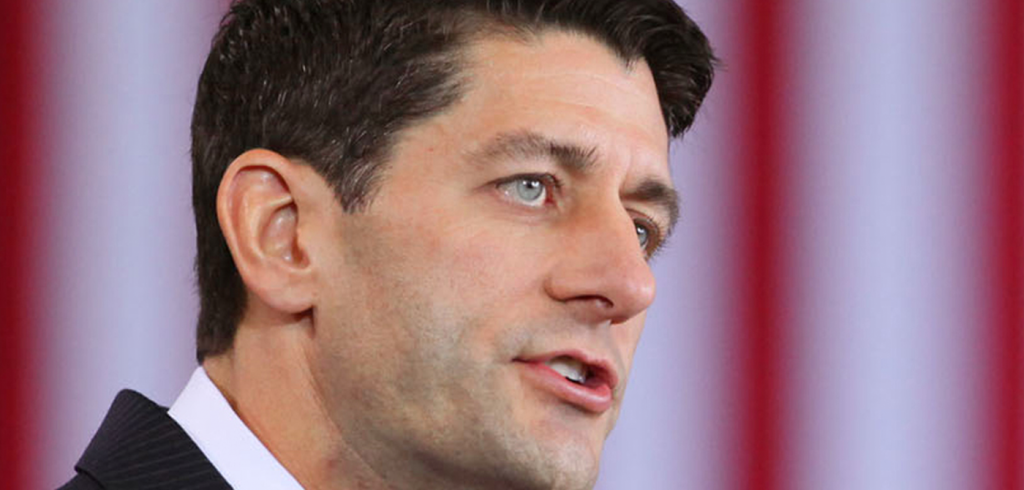
House Speaker Paul Ryan’s abrupt announcement that he will retire rather than seek another term in Congress as the steady if reluctant wingman for President Donald Trump sent new ripples of uncertainty through a Washington already on edge and a Republican Party bracing for a rough election year. The Wisconsin Republican cast the decision to end his 20-year career as a personal one — he doesn’t want his children growing up with a “weekend dad” — but it will create a vacuum at both ends of Pennsylvania Avenue. It will leave congressional Republicans without a measured voice to talk Trump away from what some see as damaging impulses, and it will rob Trump of an influential steward to shepherd his more ambitious ideas into legislation. It’s unusual for a House speaker, third in line to succeed the president, to turn himself into a lame duck, especially so for Ryan, a once-rising GOP star who is only 48 and was the party’s vice presidential candidate in 2012. His decision fueled fresh doubts about the party’s ability to fend off a Democratic wave, fed by opposition to Trump, in November. And it threw the House into a leadership battle that could end up pushing Ryan aside sooner than he intended and crush any hopes for significant legislation before the election. Ryan, though, said he had no regrets after having accomplished “a heckuva lot” during his time in a job he never really wanted. He said fellow Republicans have plenty of achievements to run on this fall, including the tax cuts Congress delivered, which have been his personal cause and the centerpiece of his small-government agenda, even though they helped skyrocket projected annual deficits toward $1 trillion. “I have given this job everything I have,” Ryan said Wednesday. Speculation over Ryan’s future had been swirling for months, but as he dialed up colleagues and spoke by phone with Trump, the news stunned even top allies. Ryan announced his plans at a closed-door meeting of House Republicans. Rep. Mark Walker of North Carolina said an emotional Ryan “choked up a few times trying to get through” his remarks and received three standing ovations. He later briefly thanked Trump in public for giving him the chance to move GOP ideas ahead. While Ryan was crucial in getting the tax cuts passed, a prime Trump goal, he and the president have had a difficult relationship. Trump showed impatience with Congress’ pace in dealing with his proposals, and Ryan had to deal with a president who shared little of his interest in policy detail. Still, for many Republicans, it’s unclear who will be left in leadership to counterbalance Trump. Ryan has been “a steady force in contrast to the president’s more mercurial tone,” said Rep. Mark Sanford of South Carolina. “That’s needed.” The speaker had been heading toward this decision since late last year, said a person familiar with his thinking, but as recently as February he had considered running for another term. His own father died suddenly of a heart attack when he was 16, and though Ryan is in good health, the distance from his family weighed on him. A final decision was made over the two-week congressional recess, which he partly spent on a family vacation in the Czech Republic. Ryan, from Janesville, Wisconsin, was first elected to Congress in 1998. Along with Reps. Eric Cantor and Kevin McCarthy, he branded himself a rising “Young Gun” in an aging party, a new breed of hard-charging Republican ready to shrink the size of government. He was GOP presidential nominee Mitt Romney’s running mate in 2012. Ryan was pulled into the leadership job by the sudden retirement in 2015 of Speaker John Boehner, who had struggled to control the chamber’s restless conservative wing. He has had more trust with the hardliners in the House. “That’s probably his greatest gift to us,” said Rep. Kevin Cramer of North Dakota. “His ability to bridge the vast divide.” House Majority Leader McCarthy, a Californian known to be tighter with Trump, is expected to again seek the top leadership post that slipped from his reach in 2015. He will likely compete with Majority Whip Steve Scalise of Louisiana. Ryan’s announcement came as Republicans are bracing for a potential blue wave of voter enthusiasm for Democrats, who need to flip at least 24 GOP-held seats in November to regain the majority. As the House GOP’s top fundraiser, Ryan’s lame-duck status could send shockwaves through donor circles that are relying on his leadership at the helm of the House majority. He has hauled in $54 million so far this election cycle. Senate Majority Leader Mitch McConnell, who has worked with Ryan, praised his colleague’s tenure. The Democratic House leader, Nancy Pelosi of California, said she hoped Ryan would work constructively on bipartisan goals before he leaves. In Wisconsin, Republicans had no obvious successor in waiting. The most likely GOP candidate for Ryan’s seat is state Assembly Speaker Robin Vos, Republicans in the state said. Another Republican mentioned as a potential candidate is longtime Ryan family friend and backer Bryan Steil, an attorney and member of the University of Wisconsin Board of Regents. Democrat Randy Bryce, a colorful ironworker who has cultivated an “IronStache” moniker, had been Ryan’s best-known challenger, drawing liberal support from around the country. Janesville teacher Cathy Myers has also been running on the Democratic side. The only declared Republicans are Paul Nehlen, who was banned from Twitter earlier this year for posts criticized as racist or anti-Semitic, and Nick Polce, an Army veteran who also co-owns a security consulting firm. While his plans are uncertain once he steps down in January, Ryan has long said being speaker would be his last job in elected office. Others have suggested that an ideal job for the policy wonk could be running a think tank, noting the leader of the conservative American Enterprise Institute recently announced he would be stepping down. Republished with the permission of the Associated Press.
Boeing expands Alabama PAC-3 missile seeker facility

Aerospace and defense leader Boeing marked the completion of a major expansion at its Patriot Advanced Capability-3 (PAC-3) missile seeker facility in Alabama’s “Rocket City.” Boeing officials joined military leaders, Gov. Kay Ivey and local officials at a ribbon-cutting ceremony for the 28,000-square-foot facility at 499 Boeing Blvd. in Huntsville. The expansion will enhance the company’s ability to produce, upgrade and sustain the PAC-3 missile seeker program. Boeing is adding 70 employees to its Alabama workforce as part of the project. “This is a proud moment for Boeing,” Jim Chilton, a Boeing senior vice president, said at the event. Boeing’s Alabama-made seekers provide active data to the PAC-3 missile, which enables it to acquire, intercept and destroy enemy ballistic and cruise missiles as well as hostile aircraft using hit-to-kill technology. Boeing invested $45 million to expand the Huntsville PAC-3 missile seeker production line in 2011. In June 2017, the company produced its 3,000th seeker at the Alabama location. The missile seekers made in Huntsville are delivered to PAC-3 prime contractor Lockheed Martin. The PAC-3 missile system is deployed with U.S. Army and Army National Guard air defense units, and it has been purchased by several international customers. Work on the new facility in Huntsville began in June 2016. Boeing impact Since arriving in Huntsville in 1962, Boeing has played a key role in building the nation’s defense and space programs in Alabama. It has long ranked as the state’s largest aerospace company, with more than 2,700 employees at two main facilities in Huntsville. “Boeing has been doing business in Alabama for more than 50 years,” Ivey said at the event. “A long time ago, Boeing found that Alabama is a good place to do business, especially in aerospace and defense.” U.S. Rep. Mo Brooks and Huntsville Mayor Tommy Battle both said the work being done by Boeing keeps the U.S. safe and protects the lives of soldiers deployed overseas. Core business areas for Boeing in Alabama include missile and weapon systems, the Space Launch System (SLS), an aerospace design center, and a research and technology center. “Boeing’s continued growth in Alabama is a testament to the company’s strategic vision, as well as the skillful execution by its extremely talented workforce in the state,” said Greg Canfield, secretary of the Alabama Department of Commerce. “Boeing’s innovative work in Alabama is critical to our nation’s defense and space programs, and the company has helped the state build a significant presence in an industry with a solid future.” Boeing’s financial impact on Alabama has been measured at $2.3 billion annually. Republished with the permission of the Alabama News Center.
Democratic gubernatorial candidates debate in Birmingham, mostly agree on issues
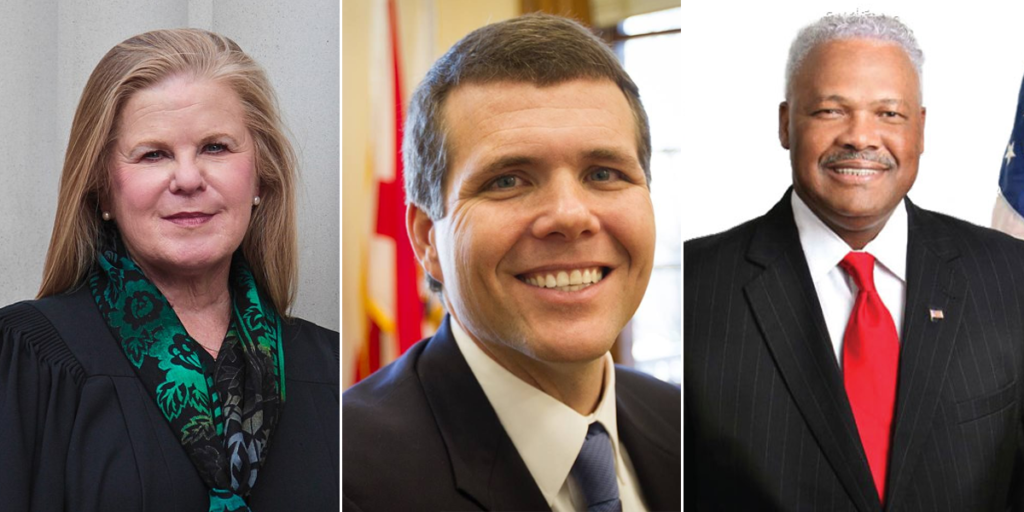
The leading Democratic contenders for governor spent much — but not all — of a Wednesday night debate agreeing with each other. Former Alabama Chief Justice Sue Bell Cobb, Tuscaloosa Mayor Walt Maddox and former state legislator James Fields appeared in the debate hosted by WVTM in Birmingham. All three expressed support for a state lottery. They also agreed Alabama should expand its Medicaid program, saying doing so would boost the entire health care system and curtail the closure of rural hospitals. They also took aim at a string of scandals that have engulfed GOP politicians in the state, and said they believed the right Democrat could win back the governor’s office for the first time in two decades. The only verbal fireworks came in an exchange between Cobb and Maddox who are largely considered the two front runners in the primary. Cobb questioned Maddox’s commitment to a statewide minimum wage increase since a local wage increase push faltered in Tuscaloosa while Maddox was mayor. “You had an opportunity to raise the minimum wage in the city of Tuscaloosa to $10.10,” Cobb said, noting that was before the passage of a statewide bill blocking cities from raising the local minimum wage. Maddox interrupted Cobb and asked if she would promise something she couldn’t legally deliver. He argued even before the statewide legislation, city attorneys across the state did not think that local governments had that authority to set a local minimum wage. “Would you be taking this position if you weren’t running for governor?” Maddox responded. In an effort to distinguish themselves both Maddox and Cobb emphasized their experience: Maddox as mayor of a city that had to rebuild after being ravaged by tornadoes and Cobb who spent decades on the judicial bench. “This election is about who is best capable to deliver us from crisis,” Maddox said. Cobb said she is the only candidate in the race who has written and helped pass bipartisan legislation. “It’s time to have a governor who cares more about the next generation than the next election,” Cobb said. Fields, a pastor, served in the Alabama Legislature for two years after becoming the first African-American elected in predominantly white Cullman County. Fields said it’s time for the state to elect someone different. “We can do the same thing and we’ll get the same results ….or we can make a change,” Fields said. The Republican contenders debate Thursday night. Gov. Kay Ivey is not participating. Republished with the permission of the Associated Press.
Calhoun Community College gets $1.5M grant for auto tech center
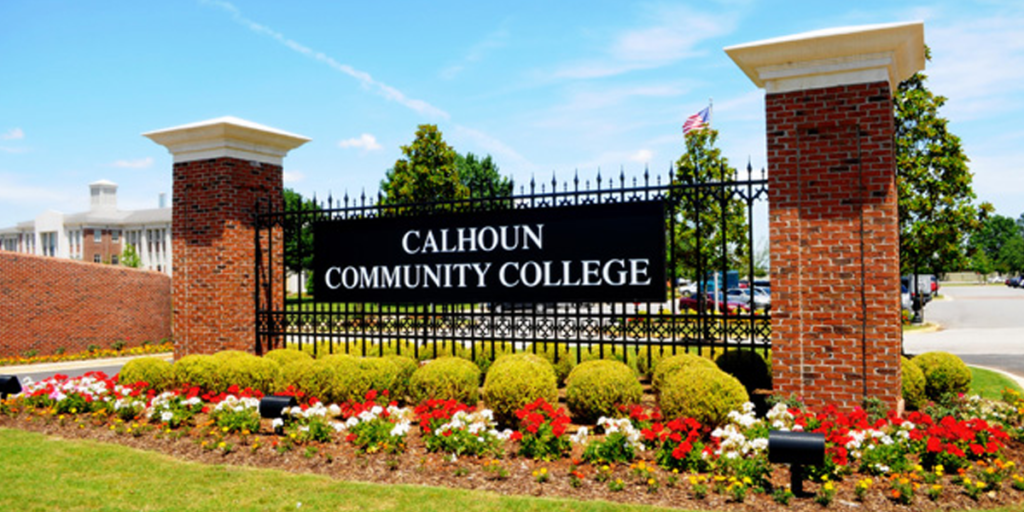
An Alabama community college has been awarded a $1.5 million federal grant for its planned automotive technology training center in Decatur-annexed Limestone County. Decatur Daily reports the grant was announced Wednesday for the Calhoun Community College’s center, which is expected to cost more than $7 million. Calhoun officials said in September that they had already received a $1.5 million grant from the state for the center, which will offer students a two-year associate’s degree. Calhoun spokeswoman Janet Kincherlow-Martin says the school plans to use reserve funds to pay for costs not covered by the grants from the U.S. Department of Commerce’s Economic Development Administration and the state. She says the college hopes to begin construction this summer and have the 23,400-square-foot building ready for classes in fall 2019. Republished with permission from the Associated Press.


